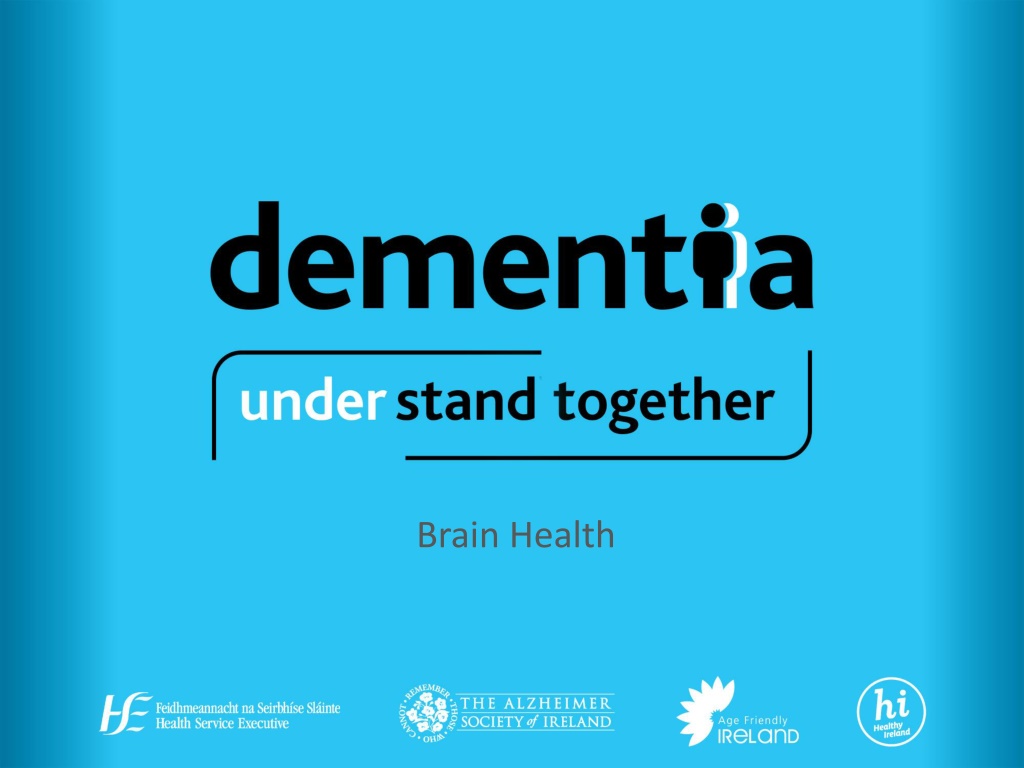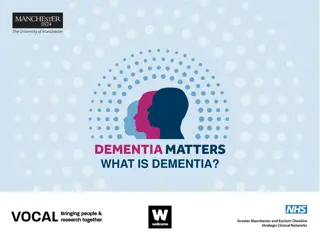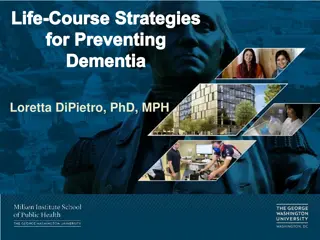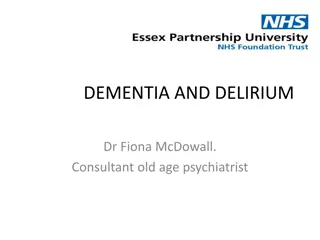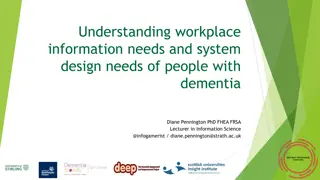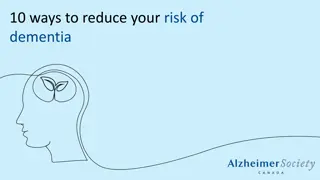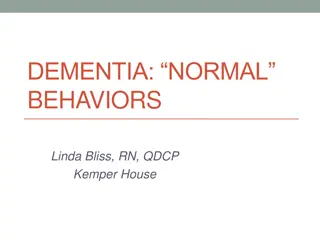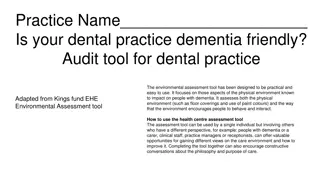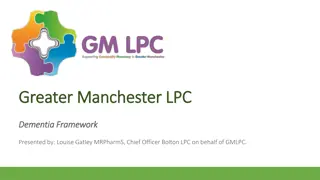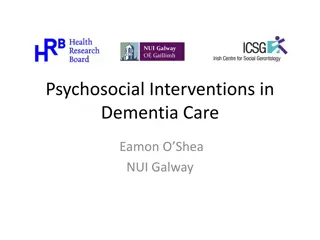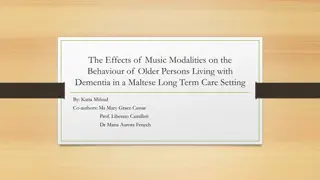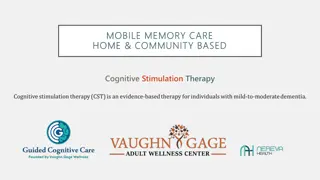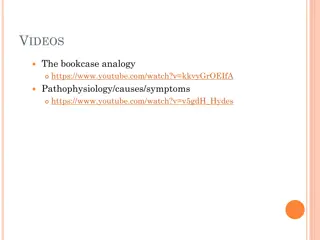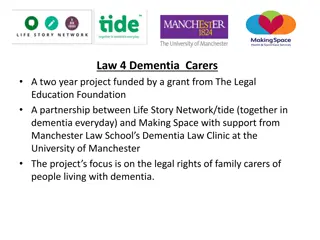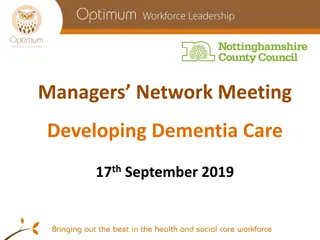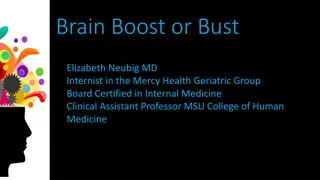Understanding Dementia Risk Factors and Brain Health
Learn about the 12 risk factors associated with dementia, focusing on how addressing these factors can reduce the risk by up to 40%. Discover the overlapping risks with heart disease and stroke, as well as specific preventive measures for maintaining brain health. Explore key strategies such as managing blood pressure, reducing exposure to pollution, protecting hearing, preventing head injuries, moderating alcohol consumption, and maintaining a healthy lifestyle. Take proactive steps to lower dementia risk and promote overall well-being.
Download Presentation

Please find below an Image/Link to download the presentation.
The content on the website is provided AS IS for your information and personal use only. It may not be sold, licensed, or shared on other websites without obtaining consent from the author. Download presentation by click this link. If you encounter any issues during the download, it is possible that the publisher has removed the file from their server.
E N D
Presentation Transcript
About the brain Hello Brain provides easy-to- understand scientific information about brain health. http://www.hellobrain.eu/en/ brainhealth/topic?id=brain-basics
12 risk factors associated with dementia That if addressed, could reduce dementia by up to 40 per cent: Lower levels of education in early life Social contact in later life Excessive alcohol consumption Traumatic brain injury Air pollution Hypertension Hearing impairment Smoking Obesity Depression Diabetes Physical inactivity Source: https://www.google.com/search?q=lancet+commission+2020+dementia+risk+reduction&rlz=1C1GCEU_enIE821IE821& oq=lancet+commission+2020+dementia+risk+reduction&aqs=chrome..69i57.7352j0j7&sourceid=chrome&ie=UTF-8
Some of the risk factors overlap with known risks for heart disease and stroke, like hypertension and diabetes. Some also increase the risk of cancer, such as smoking. Thus, reducing these risks has wide health benefits. Some risks are more specific to dementia, like hearing loss and brain trauma, but still very worthwhile as part of an overall approach to reducing individual risk.
1. Under pressure: Healthy adults above 40 years of age should have their blood pressure (BP) checked annually to see if it is within the healthy range. There are many ways to decrease blood pressure such as exercising, losing weight, reducing salt intake, limiting alcohol, and taking medication if prescribed. 2. Listen up: Reduce hearing loss by protecting ears from excessive noise exposure. If experiencing hearing problems, you should get your hearing tested. It s also important to wear a hearing aid if prescribed one. 3. Breathe carefully: Reduce exposure to air pollution and to second- hand tobacco smoke. 4. Use your head: Prevent head injury, including concussion, which can occur in certain sports, or due to falls. In addition to national policies for safe sports, each individual can take precautions such as always wearing the correct protective headwear for sports, cycling, work, etc.
5. Drink in moderation: If you drink alcohol, stay within the low-risk weekly guidelines, i.e. less than 17 standard drinks for men or 11 standard drinks for women. For more information on low-risk drinking guidelines, visit www.askaboutalcohol.ie, or call the HSE Alcohol Helpline on 1800 459 459. 6. Up in smoke: Quitting smoking may reduce your risk of developing dementia as well as your risk of developing cancers and heart disease. Stop smoking for 28 days and you re five times more likely to stop for good. For more information, visit www.quit.ie or call the QUITline on 1800 201 203 7. Adopt a healthy weight: Achieving or maintaining a healthy weight during your lifetime, but particularly in mid-life, is also important being more active and following a healthy diet can help this. 8. Be a good sport: Physical activity is very important for brain health. Sustained exercise in mid-life, and possibly in later life, protects from dementia. Every adult should aim to include 150 minutes of physical activity, such as brisk walking, in their week.
9. Eat well: Eating a wide variety of nourishing foods provides the energy and nutrients you need to keep your brain healthy. A balanced diet that is rich in vegetables, fruit, wholegrains, and fish, and that is low in salt and sugar, is a good starting point. 10. Mind your mind: Depression might be a risk for dementia, although dementia itself can also cause depression. Visit www.yourmentalhealth.ie for ways to look after your mental health. 11. Early to bed: Addressing other possible risk factors, like sleep, through lifestyle interventions, will improve general health and may reduce your risk. 12. Brain box: Keep your brain active. Do a crossword or puzzle. Remember your shopping list instead of writing it down. Be curious and take an interest in people. Learn something new or take up a hobby.
Key take home messages: 1) Dementia risk factor modification needs to start in middle-aged people, not in older age. 2) We may not always be able to prevent dementia, but delaying the age of onset in Ireland by 5 years would halve the prevalence of dementia.
Get Involved Email: fiona.foley@alzheimer.ie www.understandtogether.ie
